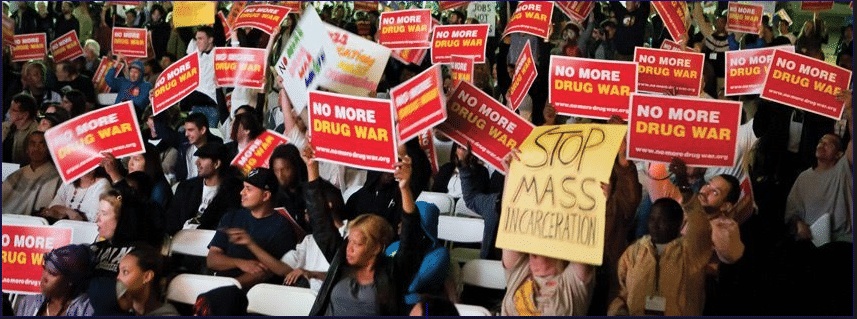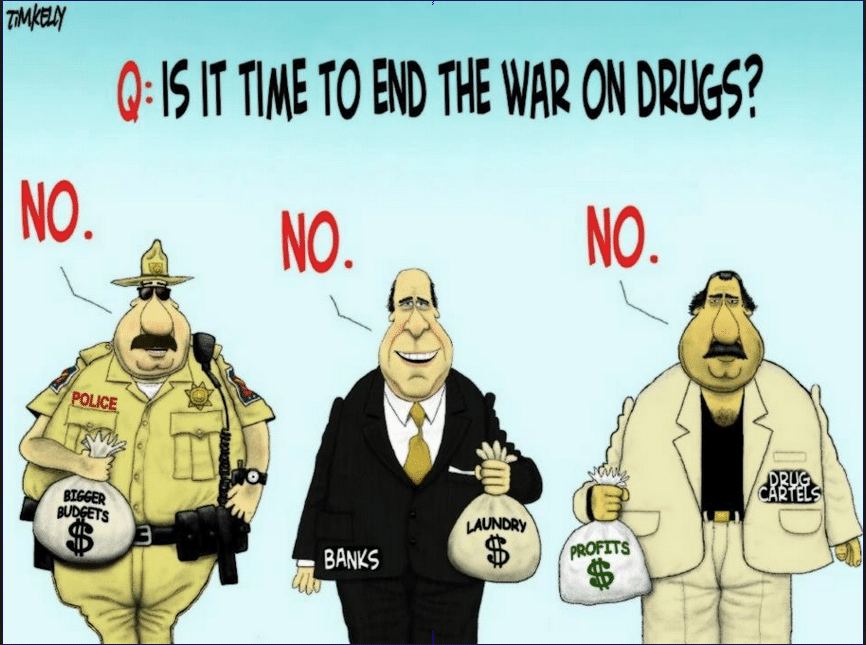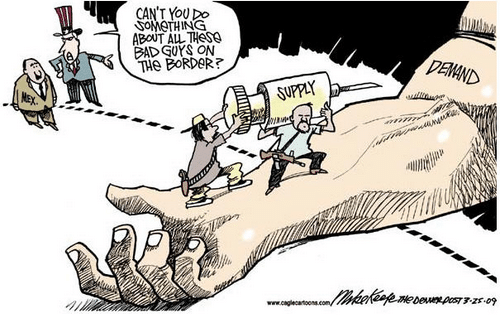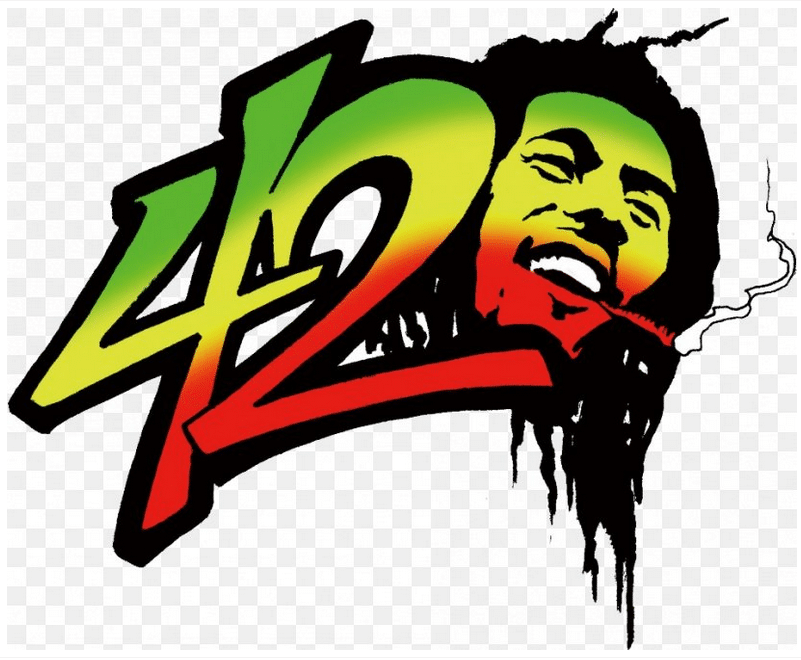Anti-immigrant crusaders in the United States scapegoat Mexicans. Never mind that Mexicans provide the cheap labor that is to the US economy what rock cocaine is to a crack head.
Likewise, anti-drug crusaders scapegoat Latino drug traffickers. Never mind that Latino drug traffickers are only supplying the US demand that fuels the never-ending War on Drugs.
(“Mexico-US Relationship Is All About Supply and Demand … of Cheap Labor and Drugs,” The iPINIONS Journal, March 31, 2009)
America has been waging its “War on Drugs” for nearly 50 years. That’s more than twice the 20 years it spent waging its war in Vietnam.
Even worse, its War on Drugs is proving even more costly and unwinnable. In fact, it has only succeeded in giving police huge budgets to squander, handing banks untold billions to launder, and making cartels rich beyond all wonder.
Meanwhile, there’s the ongoing toll, which includes the following – courtesy of the Center for American Progress, “Ending the War on Drugs: By the Numbers”:
- During this 50-year war, America arrested over 1 million people per year for possession. Yet this has had little impact on use.
- Opioids are the leading cause of all drug-related deaths (e.g., over 42,000 in 2016). But the death toll from this war is most telling south of the border, especially in Mexico where it exceeds 100,000 or twice the number of Americans who died during the war in Vietnam.
- Policemen arrest blacks at four times the rate as whites for the same drug offenses. (I have commented on the racist ways America is prosecuting this war in “The Real Drug War: Crack vs. Powder Cocaine,” August 5, 2010, and “(Black) Users of Crack vs. (White) Users of Powder Cocaine,” November 3, 2011. But I highly recommend Jay Z’s short video “The War on Drugs: From Prohibition to Gold Rush” for a more personal take.)
- Every one of the $1 trillion spent waging the War on Drugs has been wasted.
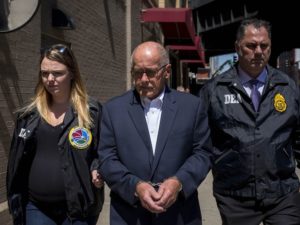 Significantly, that second point explains why law-enforcement authorities are now treating pharmaceutical drugs like dope and arresting pharmaceutical executives like drug lords.
Significantly, that second point explains why law-enforcement authorities are now treating pharmaceutical drugs like dope and arresting pharmaceutical executives like drug lords.
Boston jury convicted Insys Therapeutics founder John Kapoor and four former executives of racketeering and other crimes in a fentanyl bribery case that federal prosecutors say helped fuel the U.S. opioid epidemic.
‘Just as we would street-level drug dealers, we will hold pharmaceutical executives responsible for fueling the opioid epidemic by recklessly and illegally distributing these drugs, especially while conspiring to commit racketeering along the way,’ U.S. Attorney Andrew Lelling said in a statement.
(CNBC, May 2, 2019)
Except that arresting pharmaceutical executives will have no greater impact on this war than arresting drug lords or incarcerating drug users has had. This, because the only way to affect the law of supply and demand is to change the latter.
Again, the United States is wasting hundreds of billions each year on interdiction and incarceration. And nothing telegraphed its intent to continue doing so quite like President Trump interrupting the “War on COVID-19” for this:
Trump administration officials announced Wednesday that the U.S. military would send naval ships and aircraft to the Caribbean as part of an enhanced counternarcotics operation.
President Trump and other top officials discussed the operation at the top of a White House coronavirus briefing Wednesday evening. Trump said it was important not to let drug cartels ‘exploit the pandemic to threaten American lives.’
(The Hill, April 1, 2020)
Of course, the only person exploiting the pandemic was this congenital projector-in-chief. Because his announcement was nothing more than a wag-the-dog attempt to deflect from his failures as commander-in-chief in this War on COVID-19.
Granted, if this were any other president, you’d be forgiven for thinking this report was an April Fools’ Day joke. Alas, it was just another day in the presidency of Donald J. Trump.
But the best way to change the “demand that fuels” this war is to spend those billions on public education, drug treatment, and other health-related programs. In other words, treat “drug use as a healthcare issue, not as a criminal-justice issue.”
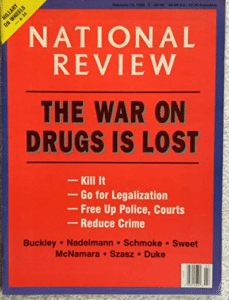 This is why I’ve been arguing since the 1990s that the best way to fight this war is to legalize drugs. Back then, no less a person than conservative columnist William F. Buckley Jr. was declaring “The War on Drugs Is Lost”:
This is why I’ve been arguing since the 1990s that the best way to fight this war is to legalize drugs. Back then, no less a person than conservative columnist William F. Buckley Jr. was declaring “The War on Drugs Is Lost”:
We are speaking of a plague that consumes an estimated $75 billion per year of public money, exacts an estimated $70 billion a year from consumers, is responsible for nearly 50 per cent of the million Americans who are today in jail, occupies an estimated 50 per cent of the trial time of our judiciary, and takes the time of 400,000 policemen — yet a plague for which no cure is at hand, nor in prospect…
How many users of illegal drugs in fact die from the use of them? The answer is complicated in part because marijuana finds itself lumped together with cocaine and heroin, and nobody has ever been found dead from marijuana.
(The National Review, July 1, 1996)
That was nearly a quarter century ago – before opioids began making heroin look as harmless as marijuana. More to the point, all the government has to show for its war efforts since then is a doubling or worse of every drug-related toll. Given this, it constitutes an unconscionable march of folly to continue fighting this war.
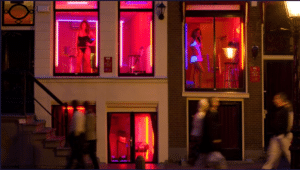 Incidentally, reading stimulated my libertarian consciousness in my teens. But a pilgrimage to Amsterdam’s Red Light District in 1983 (i.e., before it became Disneyfied) consummated it.
Incidentally, reading stimulated my libertarian consciousness in my teens. But a pilgrimage to Amsterdam’s Red Light District in 1983 (i.e., before it became Disneyfied) consummated it.
This is why I found Buckley’s arguments in favor of legalizing drugs entirely consistent with arguments in favor of legalizing prostitution. And the best of those arguments always drew analogies between prostitution and Prohibition. But I digress …
Buckley’s commentaries in his National Review inspired me (and far more notable commentators) to champion the cause of legalization. In addition to those cited above, I refer you to such commentaries as “Legalize Drugs,” October 20, 2011, “Legalize Marijuana,” October 30, 2013, and “It’s High Time to Legalize Drugs,” July 17, 2015.
The last of those includes the following:
____________________
Don Winslow is the bestselling author of such crime and mystery novels as Savages. He is currently enjoying critical acclaim, as well as commercial success, with his latest novel, The Cartel, which chronicles the myriad reasons the War on Drugs has been a tragic failure. …
He argues that, at the very least, [legalization] would save the billions wasted each year fighting this ‘unwinnable’ war, while generating billions in revenues by taxing drugs at the same rate as tobacco and alcohol. He sums up his plea as follows:
‘The War on Drugs is not only futile, it is wrong. The answer is legalization. The only way to win is to stop fighting.’
____________________
Hear, hear!
Mind you, legalization does not preclude jailing manufacturers and sellers for conspiring to “recklessly and illegally distribute these drugs.” Because, by definition, doing so makes them more drug cartels than pharmaceutical companies.
I will spare you my diatribe on the hypocrisy inherent in prohibiting opiates while legalizing tobacco. Instead, I shall suffice to note that it is also addictive and kills far more people each year (over 400,000) than any illegal drug.
Like Buckley, however, I cannot stress enough that charts on the causes of death in the United States invariably show 0 deaths from marijuana. Accordingly, I am encouraged that 25 states have shown due appreciation for this fact by either legalizing or decriminalizing its use.
That said, I feel like ending with Bob Marley’s riff, “Excuse me while I light my spliff.” But sharing the chorus from his Three Little Birds seems more fitting in this time of corona:
Don’t worry about a thing
‘Cause every little thing gonna be alright
Singing’ don’t worry about a thing
‘Cause every little thing gonna be alright
Related commentaries:
Mexico-US…
crack vs powder…
Legalize drugs…
Legalize marijuana…
projection…
High time…
Prostitution…
